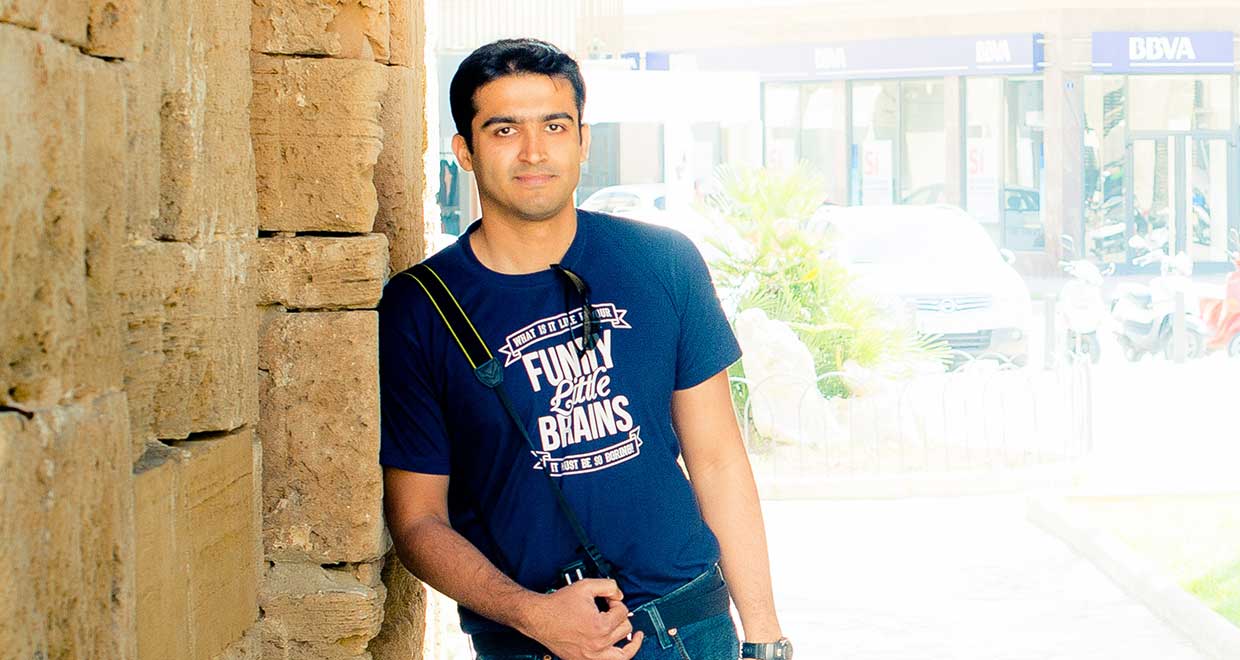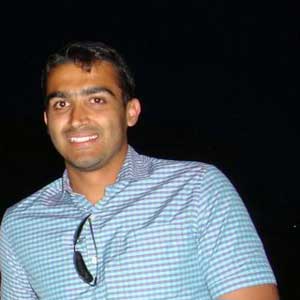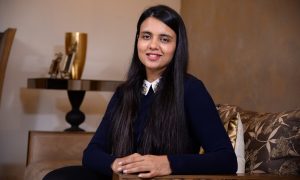Anirudh Rao is a London-based Legal Counsel for Infosys Limited. He graduated from University Law College, Bangalore in 2009. Thereafter he pursued an LL.M from The George Washington University Law School, Washington, DC. He joined the World Bank Group as an Associate before shifting to his current job. In this interview he talks about:
- LL.M from George Washington University
- Tips on SoP, scholarships, interviews with foreign law firms/companies
- Working at World Bank Group and Infosys, London
Our readers are mostly lawyers and law students, how would you introduce yourself?
I am Anirudh Rao, a London based Legal Counsel for Infosys Limited. Prior to joining Infosys, I worked for the World Bank Group as an Associate in Washington, DC. I graduated from The George Washington University Law School, Washington, DC in 2010 and University Law College, Bangalore University in 2009.
What motivated you to gravitate towards law, as a discipline and a career?
I was keen on doing something that involved the right mix of problem-solving, analysis and creative thinking. Although it did flutter the dovecotes, the one thing I knew for sure was that I did not want to touch math with a bargepole! Having been driven towards humanities from my high school years, pursuing a degree in law therefore seemed to be a natural progression as a career choice for me.
Please tell us about your time at University Law College. What experiences during these five years would you think particularly helped you shape as a law professional?
I attended University Law College (ULC) from 2004 to 2009. One of the key advantages I felt about attending ULC was that it allowed me adequate time to participate in moot court competitions, contribute to law journals and gain practical knowledge through internships. At the end of each semester during the course of my degree I interned at both law firms and companies, and during the year I was able to leverage my research skills to write papers that eventually got published in both print and online law journals. It was these experiences that helped bring a lot of perspective in to what I wanted to do as well as shape my career as a lawyer.
What was the decisive factor that prompted you to choose George Washington University Law School from the plethora of options available? Did you always have higher studies in your mind? If not, what motivated you to go in for the same?
I always wanted to be able to savour the experience of being an integral part of a multi-cultural, ethnic and linguistic class of creative and persevering minds from around the world sharing more than just the need for scholarly advancement.
Washington, DC being the seat of power of the US government and major international organisations is also a cosmopolitan center for international commerce and business. I felt being in DC and attending GWU located in the heart of DC would put me at a distinct advantage to expand my professional network. I was also awarded the Thomas Buergenthal Scholarship on the basis of academic merit which covered my tuition for a semester.
Would you suggest having a brief work experience before applying for LL.M.?
I had no work experience when I went to pursue an LL.M. Personally, I have no regrets looking back at my decision because it did not impede my career progression. However, I also recognise that having some work experience certainly helps in building perspective on taking a decision regarding the preferred area of study and shaping one’s career path.
How did you structure your SoP? Please share some tips for a successful application. What according to you is a good profile for securing scholarships & funding?
I don’t think I was alone in writing the first draft of my SoP and feeling like I got it wrong. A law school receives hundreds of applications and the evaluators are tasked with the arduous responsibility of reading all of them. What one needs to avoid is stating the obvious, being extraneous or generally lacklustre. A strong opening paragraph will keep the evaluator’s interest to read the rest of the SoP with a positive mindset.
With regards to scholarships and funding, I feel that having the right mix of consistent academic performance with moot court achievements, publications and internship experience will be able to propel applications further. Highly ranked universities look for more of well rounded CVs; highlighting any outstanding sporting achievements, social volunteering and/or any other stellar achievements goes a long way in securing coveted seats and hopefully scholarships to go with it.
Please tell us about your time at GWU. Was it difficult for you to adjust to a US based education system? What differences did you find in the educations system of India and US?
GWU Law School was a fantastic experience. The faculty ranged from a former judge in the International Court of Justice, a former Register of Copyrights to subject matter experts who have testified before the US Congress. My campus life ranged from attending socials, intramural and intercollegiate sports, live music concerts and town hall meetings. My fellow students were from 30+ different countries around the globe; people ranging from former judges to a South Korean guard who previously manned the De-Militarized Zone between the two Koreas. It was a perfect opportunity to make lasting friendships in the legal fraternity across the globe.
The LL.M program at GW is designed to allow international students to settle into the US learning system through specific coursework and breakout sessions; as such, it was not difficult to adapt to the changed circumstances. I was also fortunate to have great professor-mentors.
Education systems in India and US are as different as chalk and cheese. As one would expect, classes were interactive rather than lecture based which meant one would have to go prepared to class. The culmination of the course at the end of the semester did not always end up in taking a routine exam to regurgitate what one had memorised through the past months. We had a repertoire of assessments including presentations, research paper submissions and theses. Students were also graded on the quality of interactions in class through the semester.
How did your induction into the World Bank Group as an Associate take place? Were there any interviews or selection processes?
The World Bank is located next to GWU Law School in Washington, DC. In fact, I took classes where I would look out the window and dream about crossing the street and working there after graduating! The US economy hadn’t fully recovered from the recession in 2010, jobs were few and far between; being based in DC certainly played a major role in securing a job at the World Bank. I would show up at World Bank hosted events and spent considerable time and effort networking with officials and engaging in conversation about their work while expressing my willingness to collaborate with them in their projects.
Initially I was offered a short term contract. I continued to network which eventually led me to the Head of Operations and Business Strategy at the Global Environment Facility (GEF) who requested me to apply for an advertised posting through the World Bank’s job portal. Few weeks later I was called for a formal interview that was lead by a panel of four. I was asked questions about my background, competencies and how I would be a fit to the role. I came out feeling positive about my answers, a few days later, I got an email from then offering me a full-time staff position. My time there was exceptional, one experience that stands out for me was a project mission to Liberia and travelling across the country to pristine Lake Piso along the border with Sierra Leone to oversee a land degradation project.
Currently you work as a Legal Counsel at Infosys, London, UK. Which events led to your induction into Infosys, London? How did your appointment take place?
I was introduced to the then General Counsel of Infosys, through a friend, whom I later met at a World Bank hosted event in Washington, DC. I was looking to transition to the private sector and we discussed briefly about my interest in a contracts and commercial transactional role that Infosys was looking to fill. I wanted to have the benefit of a multi-jurisdictional profile and felt that crossing the Atlantic over to London would exemplify a vibrant work experience. After a round of interviews in Bangalore and working there for a year, London has been home to me and I am thoroughly enjoying it.
What does your current work profile at Infosys consists of? What is a typical workday like? Are there new challenges everyday or has work settled into a predictable pattern?
My profile is that of a commercial transactions counsel with a responsibility to lead negotiations, draft and review contracts for the provision of IT services and deliverables. I work with a vast array of customers both in the UK and in continental Europe across industries including but not limited to finance, retail, energy and utilities and manufacturing.
A typical work day includes liaising with internal teams, negotiations with clients and assisting the business with both contracts and compliance related legal support.
Everyday brings with it a new set of challenges and that is the way it should be to keep oneself intellectually stimulated.
Tell us a bit about work culture in UK. Would you say that there exists a difference in the working environment of UK and USA?
Both the UK and the US in general are very accepting and cosmopolitan societies to expatriates. I felt that differences between the UK and US’s working culture revolves around communication styles, sense of humour and emotional expressiveness. Especially while working in a client facing role as a lawyer where one gets the opportunity to work with people across cultures, I think it is critical to pay attention to one’s surroundings and take ample time to reflect on other people’s behaviour as well as one’s own.
Can you give us advice on applications and interviews, especially with foreign law firms/companies?
When applying to foreign companies and organisations, students are competing against local graduates who by no means are in short supply both in terms of quantity and talent. It is especially crucial to stand out and exceed expectations. The humble resume is expected to tell a student’s story in one or two pages and may be able to open the first door. One can benefit from getting their resumes peer reviewed for substance and consistency. Interviews can be daunting, however, one must manifest hunger, drive and confidence to convince why they are the right fit for the job.
Any plans to come back to India?
No fixed plans yet. There is an excitement in playing it by the ear. But who knows what the future holds!
Aside from work, we understand that you are a running enthusiast, can you tell us more?
Running gives me a nonpareil high and is also a stress buster. I started running long distance as a student and haven’t looked back since. I run both for pleasure and competitively. The two personal triumphs that stand out for me are the Auroville Half Marathon in Pondicherry in 2014 where I finished in the top 10% with about 500 runners competing and the Coorg Escapade half marathon also in 2014 where the relay team that I led finished third overall. The former was a trail run in the wilderness starting before sunrise in low visibility and the latter was a challenging high gradient uphill trail run in a tea estate setting with twists and turns across waterfalls, streams and green pastures.
What are the three activities on a scale of priority, you would recommend?
It is important for students to carve out an individualistic identity. At the same time, one should not forget to enjoy one’s time as a student. Personally, I benefited greatly from the following activities:
- internships
- law review publications and
- moot courts.
Lastly, what would be your parting message for our readers?
In the words of Muhammad Ali “He who is not courageous enough to take risks will accomplish nothing in life”. Getting cocooned in a comfort zone is always easy but getting off the beaten track and persevering will always pay off, sooner or later.

























